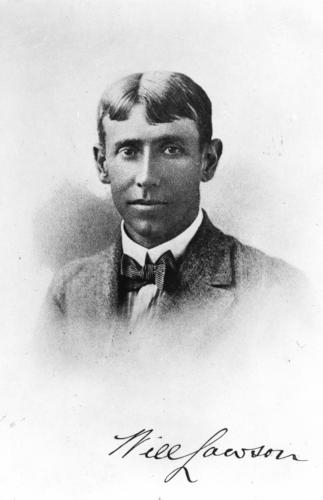Scrape the bottom of the hole: gather up the stuff!
Fossick in the crannies, lest you leave a grain behind!
Just another shovelful and that'll be enough-
Now we'll take it to the bank and see what we can find...
Give the dish a twirl around!
Let the water swirl around!
Gently let it circulate -- there's music in the swish
And the tinkle of the gravel,
As the pebbles quickly travel
Around in merry circles on the bottom of the dish.
Ah, if man could wash his life -- if he only could!
Panning off the evil deeds, keeping but the good:
What a mighty lot of diggers' dishes would be sold!
Though I fear the heap of tailings would be greater than the gold ...
Give the dish a twirl around!
Let the water swirl around!
Man's the sport of circumstance however he may wish.
Fortune! are you there now?
Answer to my prayer now-
Drop a half-ounce nugget in the bottom of the dish.
Gently let the water lap! Keep the corners dry!
That's about the place the gold will generally stay.
What was the bright particle that just then caught my eye?
I fear me by the look of things 'twas only yellow clay...
Just another twirl around!
Let the water swirl around!
That's the way we rob the river of its golden fish...
What's that? ... Can't we snare a one?
Don't say that there's ne'er a one!...
Bah! there's not a colour in the bottom of the dish.
First published in The Bulletin, 31 October, 1891
and later in
Where the Dead Men Lie and Other Poems by Barcroft Boake, 1897;
Silence into Song: An Anthology of Australian Verse compiled by Clifford O'Brien, 1968;
The New Oxford Book of Australian Verse edited by Les Murray, 1986;
Classic Australian Verse edited by Maggie Pinkney, 2001;
An Australian Treasury of Australian Verse edited by Jim Haynes, 2002;
Barcroft Boake: Collected Works, Edited, with a Life edited by W. F. Refshauge, 2007; and
Two Centuries of Australian Poetry edited by Kathrine Bell, 2007.
Author reference sites: Austlit, Australian Dictionary of Biography, Australian Poetry Library
See also.
Fossick in the crannies, lest you leave a grain behind!
Just another shovelful and that'll be enough-
Now we'll take it to the bank and see what we can find...
Give the dish a twirl around!
Let the water swirl around!
Gently let it circulate -- there's music in the swish
And the tinkle of the gravel,
As the pebbles quickly travel
Around in merry circles on the bottom of the dish.
Ah, if man could wash his life -- if he only could!
Panning off the evil deeds, keeping but the good:
What a mighty lot of diggers' dishes would be sold!
Though I fear the heap of tailings would be greater than the gold ...
Give the dish a twirl around!
Let the water swirl around!
Man's the sport of circumstance however he may wish.
Fortune! are you there now?
Answer to my prayer now-
Drop a half-ounce nugget in the bottom of the dish.
Gently let the water lap! Keep the corners dry!
That's about the place the gold will generally stay.
What was the bright particle that just then caught my eye?
I fear me by the look of things 'twas only yellow clay...
Just another twirl around!
Let the water swirl around!
That's the way we rob the river of its golden fish...
What's that? ... Can't we snare a one?
Don't say that there's ne'er a one!...
Bah! there's not a colour in the bottom of the dish.
First published in The Bulletin, 31 October, 1891
and later in
Where the Dead Men Lie and Other Poems by Barcroft Boake, 1897;
Silence into Song: An Anthology of Australian Verse compiled by Clifford O'Brien, 1968;
The New Oxford Book of Australian Verse edited by Les Murray, 1986;
Classic Australian Verse edited by Maggie Pinkney, 2001;
An Australian Treasury of Australian Verse edited by Jim Haynes, 2002;
Barcroft Boake: Collected Works, Edited, with a Life edited by W. F. Refshauge, 2007; and
Two Centuries of Australian Poetry edited by Kathrine Bell, 2007.
Author reference sites: Austlit, Australian Dictionary of Biography, Australian Poetry Library
See also.

